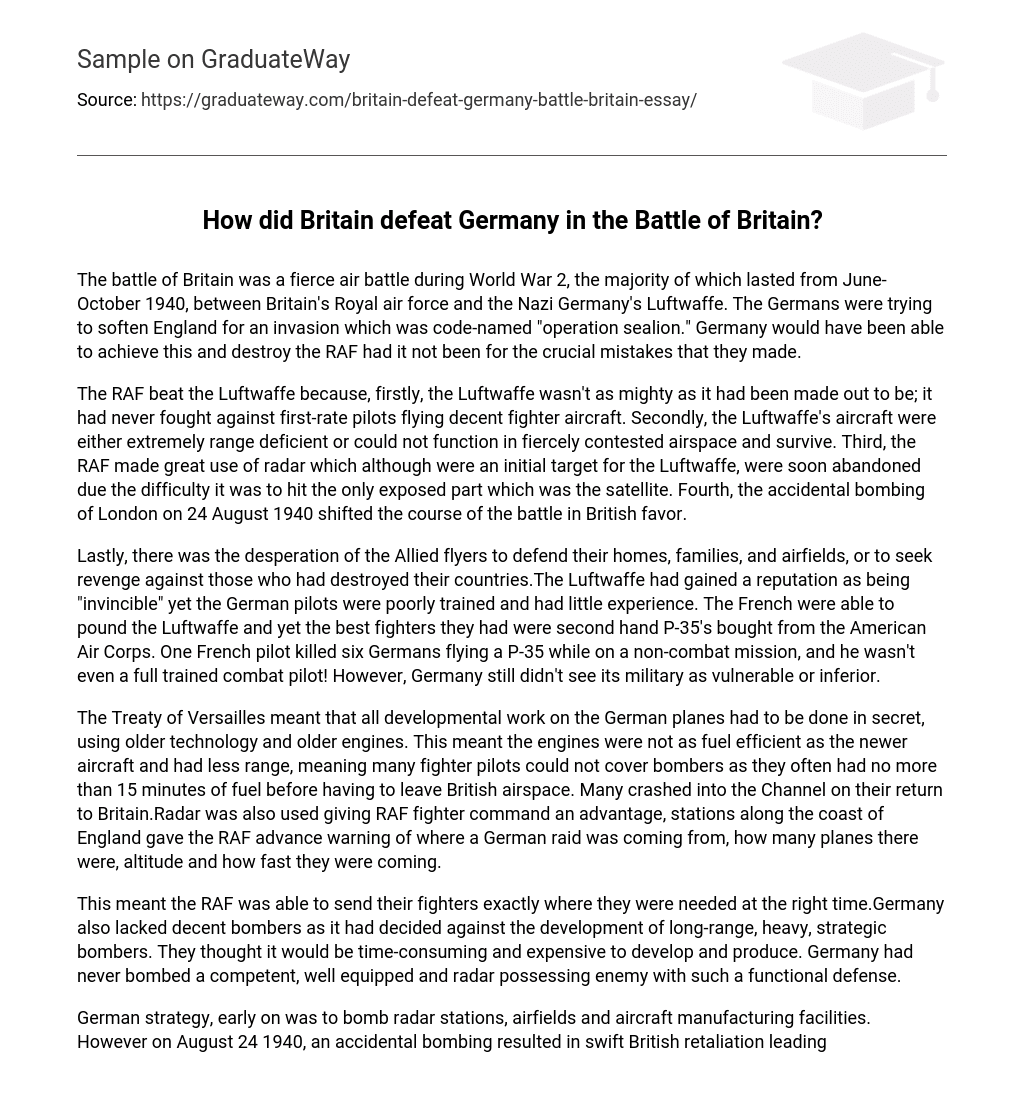The Battle of Britain occurred in World War 2 and entailed a fierce air combat between the British Royal Air Force and Nazi Germany’s Luftwaffe. This battle, happening from June to October 1940, formed part of Germany’s “Operation Sealion” strategy aimed at invading and weakening England. Despite committing crucial mistakes, Germany was unsuccessful in its mission to annihilate the RAF.
The RAF achieved success in overcoming the Luftwaffe due to several factors. Firstly, the reputation of the Luftwaffe was exaggerated as they had never encountered skilled pilots flying effective fighter planes. Moreover, the aircraft used by the Luftwaffe either had limited range or were ineffective in contested airspace. Additionally, the RAF effectively utilized radar, which initially became a target for the Luftwaffe. However, they eventually gave up as it proved difficult to damage its only exposed part – the satellite. Lastly, London’s accidental bombing on August 24, 1940, played a pivotal role in shifting the tides of battle in favor of Britain.
In summary, the Allied flyers were resolute in safeguarding their homes, families, and airfields from the destruction caused by the German pilots of the Luftwaffe. Despite being perceived as unbeatable, these German pilots lacked adequate training and experience. To everyone’s surprise, the French managed to cause substantial harm to the Luftwaffe using second-hand P-35 fighter planes acquired from the American Air Corps. Even a non-combat trained French pilot successfully eliminated six German pilots while operating a P-35 aircraft. However, Germany remained oblivious to its military’s susceptibility and inferiority.
Due to the Treaty of Versailles, all advancements in German plane development had to be conducted clandestinely, utilizing outdated technology and engines. Consequently, these engines were not as fuel-efficient as the newer aircraft, resulting in diminished range. This limited the ability of fighter pilots to provide cover for bombers, as they often had a fuel supply that lasted no longer than 15 minutes before having to exit British airspace. Consequently, many pilots crashed into the Channel upon their return to Britain. In addition, the implementation of radar provided RAF fighter command with a strategic advantage. Stations located along the English coastline allowed the RAF to receive advance notice of approaching German raids, providing critical information such as the origin, number of planes, altitude, and speed of the incoming attack.
This allowed the RAF to effectively deploy their fighters to the necessary locations and at the appropriate times. Additionally, Germany’s decision to forgo the creation of long-range, heavy strategic bombers meant they were lacking in quality bombers. This decision was driven by concerns of the time and cost involved in their development and production. As a result, Germany had never encountered an adversary with competent defense systems, advanced equipment, and radar capabilities.
Germany’s early strategy was to bomb radar stations, airfields, and aircraft manufacturing facilities. However, an accidental bombing on August 24, 1940, led to swift British retaliation and the onset of the Blitz. As a result, Britain was able to replenish lost aircraft and repair damages to airfields. Ultimately, Britain prevailed over Germany due to Germany’s inadequate aircraft and ill-preparedness to fight against a capable enemy defending itself.
The defeat against Britain and subsequently Russia resulted in the ultimate loss of the entire war for Germany. The allies possessed the “world’s largest aircraft carrier” to launch an attack on the Nazis. Furthermore, this defeat demoralized the Germans, weakening their capability to combat. If Germany had triumphed in the Battle of Britain, they might have emerged victorious in the war.





